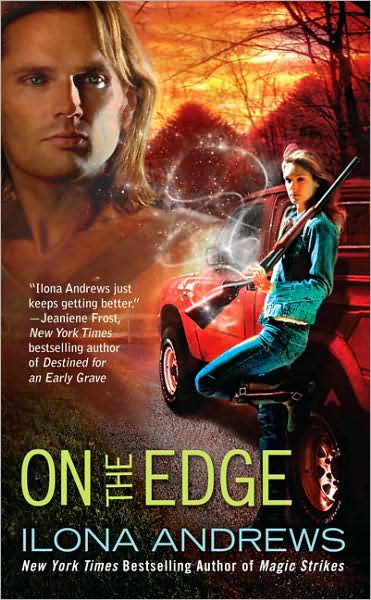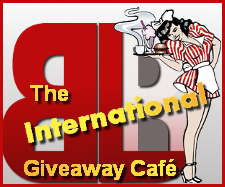Thanks to the inimitable pattepoilue, our new feature has a better name: Genres 101. I hope everyone is seated comfortably, with pencil and paper ready, as we begin the first in our series of lectures (ok, I might be stretching that a bit but just go with me, k?) on the definitions and applications of genre names.
The main common denominator in all of these seemingly similar, imaginative, genres is that they all fall under the “Speculative Fiction” label. I mentioned before, that for Spec Fic, I always think of the question “What if?” as the determining factor in placing a book in this category. But there are so many answers to that question, that we must break it down separately. Today’s lesson will cover all (most?) things under the realm of “Fantasy.”
For me, I’ve always linked Fantasy and Science Fiction together…be it Stars Wars or Dungeon & Dragon-y type stuff, I figured that the common element was that they were all just made up; fantastical. But, there is a difference! And what is it? Logic, or more accurately, Science Fiction attempts to explain in a logical fashion, why and/or how the world, mutated people, etc. exist. Fantasy offers no such explanation. The reader just has to except the existence (in the story) of whatever strange and wonderful elements are presented to them. So, at this point we say “live long and prosper”, in our best Mr. Spock voice, to Science Fiction and get deeper into the Fantasy realm. (Don’t worry, Sci-Fi, we’ll get back to you another week.)
 Fantasy, as described in the Wiki article, contains, at its base, magic and supernatural phenomena. There are inspirations from folklore and myth. Many times, medieval settings are used within the category, but this is not a hard and fast rule anymore. But even within the Fantasy label there are further sub-genres, which I will offer up some definitions and examples of here:
Fantasy, as described in the Wiki article, contains, at its base, magic and supernatural phenomena. There are inspirations from folklore and myth. Many times, medieval settings are used within the category, but this is not a hard and fast rule anymore. But even within the Fantasy label there are further sub-genres, which I will offer up some definitions and examples of here:
Dark Fantasy – this covers a blending of fantasy and horror. I stay clear of horror titles (it took me two years to get through Stephen King’s Christine!) so I don’t have much in the line of examples here, though Wiki says Clive Barker and Buffy the Vampire Slayer….K, this seems more comedy versus horror, but what do I know?
Mythology – This one was further down on the list, but I felt it needed to be moved up. Mythology has been the basis of many books over thousands of years. Think Homer’s Odyssey for one. But you find mentions throughout literature of mythological creatures; Shakespeare, Pope, among others use these elements in their works. More recently, Rick Riordan’s Lightning Thief series focuses heavily on Greek mythology and Lesley Livingston’s “urban faerie trilogy” draws from Celtic and Norse mythology. If you think about it, the preternatural creatures we see in many novels now, have their roots in folklore and myths.

Epic/High Fantasy – This involves serious themes with “grand struggles”, often featuring a character that starts off young. aging as the story unfolds. This type of story usually takes place in either a parallel world, a world-within-a -world, or a world that is accessed through a portal. Examples here could include Guy Gavriel Kay (a personal fave), David Eddings’ Belgariad series (which reminds me that it’s time to re-read this series!), Jim Butcher’s Harry Dresden books, Harry Potter, Robert Jordan’s The Wheel of Time…and I could go one. I personally seem to have a particular love of this genre 🙂
Low Fantasy – This is similar to the above but taking place in the “real” world (as a funny aside, Wiki makes the distinction here of clarifying that the name of the subgenre does not in any way reflect the quality of the work, hehehe)
Superhero Fantasy – Featuring main characters with extraordinary powers or equipment that helps them fight crime. A heroes versus villian theme. I can’t think of anything that isn’t a comic book that fits in this category…can you?
Sword & Sorcery – This one seems self explanatory…King Arthur stuff, for sure, fits the bill.
Wuxia – I’m including this one because of the funky name. This involves martial arts adventures. I think Crouching Tiger, Hidden Dragon but can’t actually come up with a fantasy book title that fits here….again, I’d love suggestions from you readers out there.
And now the most popular distinctions you’ve all been waiting for:
Paranormal Fantasy – Though it has this name, the description is more about the “Paranormal Romance”. The big factor here is the romance; it is the main feature of the novel but contains the elements that are beyond scientific explanation. Vamps, shapeshifters, ghosts, time travel, telepathy are some of the supernatural phenomena we’ll find within the pages; though unusual, who’s to say there’s not love to be found amongst these beings/creatures? My big example: Twilight! All else aside in the story line, it’s Bella and Edward’s love that is the ultimate draw. What other authors/novels can you think of here?
Urban Fantasy – The biggest criteria in urban fantasy is that it is set in a city. Usually set in contemporary times, it can also take place throughout historical times, too. Cassandra Clare’s Mortal Instruments is a good example, but so is her Infernal Devices series, which is set in Victorian London (though I’d argue it’s place in the Clockpunk genre, which falls under Science Fiction…definition to follow another day). Other authors in this category, and some you’ll definitely find around our pages at BLI:, Nancy Holzner, Laurell K. Hamilton, Kim Harrison, Jeaniene Frost, and Jennifer Rardin. Having started Stacia Kane’s Unholy Ghosts, I would suggest this series fits also…although it contains elements of apocalyptic fiction (another tease from me 😉 )
All in all, fantasy includes things we can’t explain and we just accept the imagined worlds as they are. My biggest issues with this are
A) mythology as we call it now was once actual religious beliefs in many cultures and
B) who says ghosts, vampires, etc don’t exist? Well, for all the crazies out there
(like me) that believe in possibilities, we’ll create a separate genre called “Fantastic Realism”
(there was also a subgenre called magic realism, but that just seemed a little oxymoronic to define…though it’s linked here for more info). I hope this cleared up some of the blurriness between the (sub)genres of Fantasy.
If there are other genres that need clarification, please comment with your suggetions! I’ll be happy to oblige 🙂 Otherwise, stay tuned for things like Gothic Fiction, Medical Mysteries, Frontier & Settlement Stories and more!

About Jackie
Jackie is a quirky mom, living in Ontario, Canada. She's a bookkeeper by day and a book lover by night. She also blogs at The Novel Nation and writes occasionally for Heroes and Heartbreakers.
 Fantasy, as described in the Wiki article, contains, at its base, magic and supernatural phenomena. There are inspirations from folklore and myth. Many times, medieval settings are used within the category, but this is not a hard and fast rule anymore. But even within the Fantasy label there are further sub-genres, which I will offer up some definitions and examples of here:
Fantasy, as described in the Wiki article, contains, at its base, magic and supernatural phenomena. There are inspirations from folklore and myth. Many times, medieval settings are used within the category, but this is not a hard and fast rule anymore. But even within the Fantasy label there are further sub-genres, which I will offer up some definitions and examples of here:

















 Blog RSS Feed
Blog RSS Feed Follow Me on Twitter
Follow Me on Twitter My Facebook
My Facebook
Thank you! I am hopeless with genre definitions.
Stacie
GeishasMom73
Great post. I am hopeless myself at genre defining. Sometimes I even make up my own to my blog partners dismay. 🙂
Space opera? And since it's the real world, just one that us muggles don't interact with much, should Harry Potter be Low Fantasy? (I've never heard it called that before, but fun!) What's the difference between urban fantasy and low fantasy, then?
Thanks for this post. It's raised some great questions in my own brain. And it's reminded me to re-read David Eddings as well.
This is one to be bookmarked! Back in the old days, there was just science fiction/fantasy, with maybe a bit of dystopia or post-apocalyptic fiction thrown in for good measure. I imagine most speculative works can still fall under those general headings.
Thanks for posting!
Good post. Thanks for putting it all down in bite-size chunks.
Fantastic feature! I'll be looking forward to more Genre 101 posts. I'm really quite useless when it comes to genres.
@Stacie – Hopefully, I'll be able to help with that 🙂
@smexys_sidekick – That just shows off your creative side, right?
@Vivien – Space Opera sounds more like an off-off-off-off Broadway kinda thing, lol. I think HP would technically fit in Low but Epic/High is better because of the aging thing and the portals, etc. The only diff. I can see between the urban and low fant. is the setting – city versus anywhere else in the real world.
@Julia – Spec fic does describe it all but there are lots of distinctions as you'll see in future posts 🙂
@Chelsea – You're very welcome!
@LSU – Had I really gone in depth, you'd probably still be reading, lol. Hopefully it's enough to give you something to think about.
@Jackie – (I feel a little like I'm talking to myself :-p ) Thanks for stopping by! Hopefully we'll all learn something we didn't know before.
Very interesting! I knew the difference btw Sci-Fi and Fantasy for myself but couldn't ever explain it to anyone else so it was fun to learn that SF is based on logic. I'd never heard of Wuxia – I'll have to keep an eye out for it now!
smaccall @ comcast.net
Low fantasy? Snerk. That's one I hadn't heard of before.
I may be wrong, but I think Jennifer Estep's Bigtime series would fall into Superhero Fantasy. The books are all about…superheroes and villians! ^_^
Genre definitions can be a real pain sometimes, especially when the literati turn up their nose to one or the other. Admittedly, I am not a fan of high fantasy or the swords and sorcery stuff. I try though, because I don't want to be a snob with it comes to books–and as a horror fan, I'm all too familiar with readers not wanting to give a certain genre a chance.
Great post – can't wait to read the next lesson!!
Great post, it was really interesting reading your take on the definition of different genres.
@Sarah – Thanks! I just like saying "Wuxia…wuxia" such an odd word, lol.
@dracon – Just wait…there's more weird and wonderful stuff to come 😉
@Alisha – Thank you for doing the homework, lol. You get an A+. I'll have to check out Estep.
@Rabid Fox – So true about horror…it was easy for me to give up but maybe I should have looked into other authors…basically, I'm just a big chicken though :-p
@Birgit – Thank you! I'm glad you liked it.
@natalie – Thanks again. There are so many out there, this series may take me a while 😉